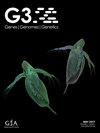Impact of Rhg1 copy number variation on a soybean cyst nematode resistance transcriptional network.
IF 2.1
3区 生物学
Q3 GENETICS & HEREDITY
引用次数: 0
Abstract
Soybean yield loss due to soybean cyst nematode (SCN) infestation has a negative impact on the U.S. economy. Most SCN-resistant soybeans carry a common resistance locus (Rhg1), conferred by copy number variation of a 31.2-kb segment at the Rhg1 locus. To identify the effects of Rhg1 copy number on the plant prior to SCN infection, we investigated genome-wide expression profiles in isogenic Fayette plants carrying different copy numbers at the Rhg1 locus (9-11 copies), that confer different levels of resistance to SCN. We found that even small differences in copy number lead to large changes in expression of downstream defense genes. The co-expression network constructed from differentially expressed genes (DEGs) outside the Rhg1 locus revealed complex effects of Rhg1 copy number on transcriptional regulation involving signal transduction and ethylene-mediated signaling pathways. Moreover, we report a variation in expression levels of phytoalexin biosynthesis-related genes that is correlated with copy number, and the activation of different NBS-LRR gene sets, indicating a broad effect of copy number on defense responses. Using qRT-PCR time series during SCN infection, we validated the SCN responses of DEGs detected in the copy number comparison and showed a stable upregulation of genes related to phytoalexin biosynthesis in resistant Fayette lines during the early stages of the incompatible interaction between soybeans and SCN, before syncytium formation. These results suggest additional genes that could enhance Rhg1-mediated SCN resistance.Rhg1 拷贝数变异对大豆胞囊线虫抗性转录网络的影响。
大豆孢囊线虫(SCN)侵染造成的大豆减产对美国经济产生了负面影响。大多数抗 SCN 大豆都带有一个共同的抗性基因座(Rhg1),该基因座由 Rhg1 基因座 31.2-kb 段的拷贝数变异所赋予。为了确定在感染 SCN 之前 Rhg1 拷贝数对植株的影响,我们研究了携带 Rhg1 基因座不同拷贝数(9-11 个拷贝)的同基因 Fayette 植株的全基因组表达谱,这些植株对 SCN 具有不同程度的抗性。我们发现,即使拷贝数的微小差异也会导致下游防御基因表达的巨大变化。从 Rhg1 基因座外的差异表达基因(DEGs)构建的共表达网络显示,Rhg1 拷贝数对涉及信号转导和乙烯介导的信号通路的转录调控有复杂的影响。此外,我们还报告了植物毒素生物合成相关基因表达水平的变化与拷贝数以及不同 NBS-LRR 基因组的激活相关,这表明拷贝数对防御反应有广泛的影响。利用 SCN 感染期间的 qRT-PCR 时间序列,我们验证了拷贝数比较中检测到的 DEGs 对 SCN 的反应,结果表明在大豆与 SCN 不相容相互作用的早期阶段,即合胞体形成之前,抗性法耶特品系中与植物毒素生物合成相关的基因稳定上调。这些结果表明,还有其他基因可以增强 Rhg1 介导的 SCN 抗性。
本文章由计算机程序翻译,如有差异,请以英文原文为准。
求助全文
约1分钟内获得全文
求助全文
来源期刊

G3: Genes|Genomes|Genetics
GENETICS & HEREDITY-
CiteScore
5.10
自引率
3.80%
发文量
305
审稿时长
3-8 weeks
期刊介绍:
G3: Genes, Genomes, Genetics provides a forum for the publication of high‐quality foundational research, particularly research that generates useful genetic and genomic information such as genome maps, single gene studies, genome‐wide association and QTL studies, as well as genome reports, mutant screens, and advances in methods and technology. The Editorial Board of G3 believes that rapid dissemination of these data is the necessary foundation for analysis that leads to mechanistic insights.
G3, published by the Genetics Society of America, meets the critical and growing need of the genetics community for rapid review and publication of important results in all areas of genetics. G3 offers the opportunity to publish the puzzling finding or to present unpublished results that may not have been submitted for review and publication due to a perceived lack of a potential high-impact finding. G3 has earned the DOAJ Seal, which is a mark of certification for open access journals, awarded by DOAJ to journals that achieve a high level of openness, adhere to Best Practice and high publishing standards.
 求助内容:
求助内容: 应助结果提醒方式:
应助结果提醒方式:


